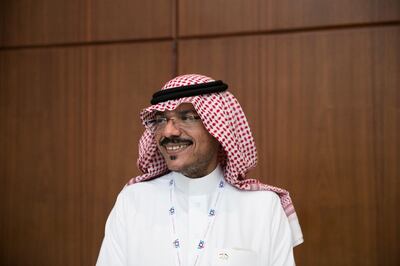Saudi Arabia is already seeing improvements just two years into a major 14-year plan to overhaul the kingdom's entire healthcare system, a senior official told The National at the Arab Health Forum on Tuesday.
Dr Mohammed Al Abdulaali, assistant deputy minister for hospital services, said that in “every quarter [last year] the needle moved in the right direction, which gives us an insight that the interventions [already carried out] … are good”.
He said a recently passed rule that food must come with calorie information had captivated public debate in the kingdom and was an example of a change that would have a major impact on consumption habits. He also said that the kingdom was set to launch a new rule about oil and fat content in the kingdom’s cooking in a bid to get people eating healthier.
The kingdom has set itself major development goals as part of a plan called Vision 2030. In health care, the top line is to increase life expectancy from 74 to 80 years old. That, Dr Al Abdulaali said, was “going to be shifting the country from one of the good zones to the best zone countries, which is a very challenging objective but it matches a visionary approach.”

The plan involves a mix of changes to front line provision but also includes a huge overhaul of how the back office health system is managed, funded and provided.
Currently, the Health Ministry oversees regulation, provision and funding. The overhaul will see the ministry hand over provision and insurance to new entities and solely handle regulation and oversight.
The new service provider will establish 20 to 30 health provision clusters, each responsible for 1 to 2 million people. These will compete not only against private providers but against each other to offer the best, most efficient care to communities.
“So the cluster is going to be a step towards accountable care organisations,” Dr Al Abdulaali said. “There are four clusters already running and a fifth and sixth is on the way.” Meanwhile, he said that at the top of government, departments were laying the groundwork for the needed legal and legislative framework to roll out the new system.
As part of the plan, Saudi Arabia is integrating new e-health service approaches. As well as a centralised electronic appointment booking system, which he said this week hit a milestone of scheduling 115,000 consultations a day, there is a new app to allow patients to speak to doctors remotely.
But Saudi Arabia is facing several major challenges in terms of health care. A 2013 Health Ministry study found that 25 per cent of the population suffered diabetes, rates of chronic illness including obesity and hypotension are high as well as rates of smoking. Car related deaths remain stubbornly high – more than five times as many people were killing on the Kingdom’s roads in 2018 than in the UAE – although it has decreased in recent years.
To address these long term issues, Dr Al Abdulaali said the country was changing the way it approaches all care.
“There will be a very important activity to go towards prevention and support of primary health care, family medicine, community medicine” over hospitalisation and treatment of illness, he said.
Dr Al Abdulaali said that the shift was not only about cutting costs of treatment but “to have a healthy dynamic community”.
However, the scale of the planned reform itself poses a major challenge. Maintaining existing service provision while transitioning to the new system when it includes large private sector involvement in a market without a large number of large-scale providers.
A relatively small percentage of the population currently has private health insurance with the government paying for everyone else. Under the new system, these rates will need to increase dramatically and new providers – both local and international – will need to get established. Likewise, international care providers are winning contracts to provide services but the scale, quantity and involvement will have to ramp up.
At the same time as these developments are taking place, the government will have to build a robust comprehensive and, crucially, brand new regulatory framework and oversight for a hugely complex system with numerous actors. This will be no small feat for a ministry that has until now been presiding over a centralised system of planning, providing and funding provision.







